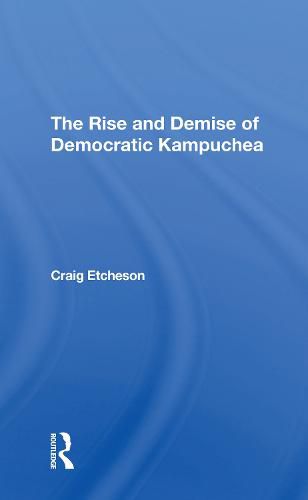Readings Newsletter
Become a Readings Member to make your shopping experience even easier.
Sign in or sign up for free!
You’re not far away from qualifying for FREE standard shipping within Australia
You’ve qualified for FREE standard shipping within Australia
The cart is loading…






This study traces the rise of Kampuchean communism from its inception in 1930 to the present. The author analyzes the socioeconomic and political conditions that brought Cambodia to an explosive stage in 1970 and documents the cataclysmic transformation that followed. The protagonist in this ongoing historical drama is the revolutionary movement known as the Khmer Rouge, or Red Khmers. Their revolution was so ultraradical that even the communists were appalled. The Soviets studiously ignored it, the Chinese vainly tried to moderate it, and the Vietnamese ultimately destroyed it. In an attempt to explain the Khmer revolution-one of the most violent in modern political history-the author focuses on the ideology created by a key group of Khmer Rouge leaders. The theoretical and historical significance of the Khmer revolution and the state of Democratic Kampuchea has received little attention from scholars, and far too much of what has been written has been motivated by a bewildering array of ideological and geopolitical interests. This book is one of the first to apply a systematic analytical framework to the creation, growth, and destruction of Democratic Kampuchea.
$9.00 standard shipping within Australia
FREE standard shipping within Australia for orders over $100.00
Express & International shipping calculated at checkout
This study traces the rise of Kampuchean communism from its inception in 1930 to the present. The author analyzes the socioeconomic and political conditions that brought Cambodia to an explosive stage in 1970 and documents the cataclysmic transformation that followed. The protagonist in this ongoing historical drama is the revolutionary movement known as the Khmer Rouge, or Red Khmers. Their revolution was so ultraradical that even the communists were appalled. The Soviets studiously ignored it, the Chinese vainly tried to moderate it, and the Vietnamese ultimately destroyed it. In an attempt to explain the Khmer revolution-one of the most violent in modern political history-the author focuses on the ideology created by a key group of Khmer Rouge leaders. The theoretical and historical significance of the Khmer revolution and the state of Democratic Kampuchea has received little attention from scholars, and far too much of what has been written has been motivated by a bewildering array of ideological and geopolitical interests. This book is one of the first to apply a systematic analytical framework to the creation, growth, and destruction of Democratic Kampuchea.